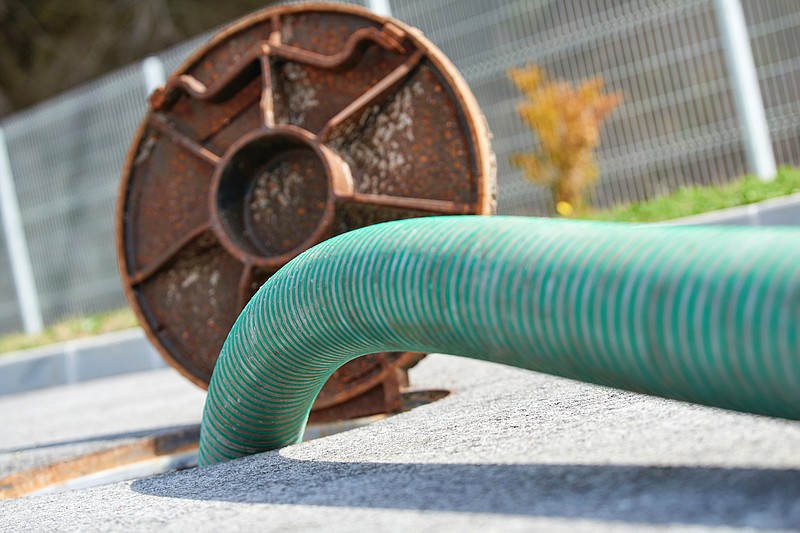Matching grants are available for some Northwest Georgia homeowners who need to repair or replace aging or failing septic systems, according to the Limestone Valley Resource Conservation & Development Council.
"If you help a person with their septic repair, you're ultimately improving the downstream impacts of water quality for everyone," Stephen Bontekoe, the council's executive director, said.
Matching grants are available in areas of the South Chickamauga Creek and Lookout Creek watersheds, part of the Trenton-based nonprofit organization's partnership with Georgia's Environmental Protection Division and the federal Environmental Protection Agency.
The council received $243,000 from the federal government for the project, which also has a match of $166,597 that includes money from landowners, volunteer time and local sources, Bontekoe said. All total, it's a nearly $410,000 investment, Bontekoe said, for a project that's begun but hasn't paid out any funds yet.
Homeowners pay contractors for the work. Once verification is received from the Georgia Department of Public Health that the work was done according to state standards, the homeowner is reimbursed by the council in 10 days or less, Bontekoe said.
The qualifying area of the Lookout Creek watershed covers most of Dade County and a sliver of western Walker County. The South Chickamauga Creek qualifying area centers on the southeastern part of Catoosa County, along with a small piece of Walker County and a western slice of Whitfield County.
More Info
LEARN MOREFor more information on the program, contact the Limestone Valley Resource Conservation & Development Council at admin@limestonevalley.org, or call 706-514-6366. There is no deadline to apply for the grants.
Mark Blevins, owner of Blevins Septic & Back Hoe in Chickamauga, Georgia, said most repairs cost $3,500 to $9,000. Most of the time, the problem is with the fill lines between the house and the tank.
"Usually it's just the lines, but if the tank is bad, you just pump it down, set a new tank right next to it and fill it in. You just abandon it in place," said Blevins, who has 14 years of experience doing septic work. The job only takes one day, he said.
(READ MORE: Georgia's Walker County to invest more than $45 million in water infrastructure)
This is month two of promoting the septic assistance program, Matt Heath, one of the council's contractors, said. It takes time to get the permits and project estimates, and he said the council has a few repair projects happening right now.
What the council will pay is flexible depending on need, he said. They council will pay less for rental property or a property that isn't a primary residence, Heath said.
Evidence of a septic system problem includes backed-up sinks and gurgling toilets. In extreme cases, a homeowner will see septic effluence in their yard - and notice the corresponding smell. Heath said he's seen some repairs as low as $1,500.
In other council work, Bontekoe said it has just finished work on Holly Creek near Chatsworth in Murray County and completed a watershed management plan for the Georgia side of Chattanooga Creek that runs through Rossville and Flintstone. Chattanooga Creek funding has been applied for but not approved.
Funding is also available to help livestock owners manage animals - and keep their water sources cleaner.
"We're able to come alongside that producer and install watering facilities, pipelines, cross-fencing and build infrastructure to manage their animals in a way to reduce impact on water quality," he said.
In streams, high bacteria runoff acts like a fertilizer that can cause "algae blooms that can make our streams less healthy and more unsightly," Heath said. The best way to learn about a creek's water quality is the state's annual testing, he said.
Bontekoe said he understands that sometimes people are struggling, and it can be a hard choice between septic repairs and feeding their family.
"We get a phone call from a property owner or Health Department that says 'Hey, can you help me?' If they're inside the watershed and have a valid need, then that's what we're here to do," he said.
Bontekoe said his organization works to support a variety of community efforts.
Not every project can get grant funding, but Bontekoe said if no funding is available, the council will still try to connect community members with experts.
Other council projects have been based on air quality, soil conservation, air quality work, endangered species work and improving habitat. The council is working on improving habitat in the Conasauga River, the boundary that divides Whitfield and Murray counties. But water quality is the organization's big "passion and focus" right now.
"Because water is so important to life, it tends to be what we come back to," Bontekoe said.
The council serves Catoosa, Chattooga, Cherokee, Dade, Fannin, Gilmer, Gordon, Murray, Pickens, Walker and Whitfield counties.
Contact Andrew Wilkins at awilkins@timesfreepress.com or 423-757-6659. Follow him on Twitter @tweetatwilkins.
